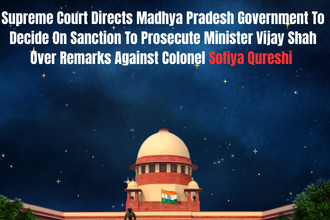The Supreme Court of India has once again clarified the contours of criminal liability under Section 306 of the Indian Penal Code (IPC), which deals with abetment of suicide. In a significant judgment, the Court held that mere refusal to marry, even if emotionally painful for the other person, does not constitute “instigation” as required under Section 107 IPC. Therefore, such refusal cannot, by itself, lead to prosecution for abetment of suicide.
This ruling came in the case titled Yadwinder Singh @ Sunny v. State of Punjab & Anr., Citation: 2025 LiveLaw (SC) 1058, where a man was charged after a woman allegedly took her own life because he refused to marry her.
Background of the Case
An FIR was registered in 2016 at Chheharta Police Station, Amritsar, after a young government advocate consumed poison and died. The deceased’s mother accused Yadwinder Singh, also known as Sunny, of abetting her suicide by betraying his promise to marry her.
According to the prosecution:
- The couple was in a relationship.
- The accused had allegedly assured the woman that he would convince his family for their marriage.
- Later, he is said to have backed out, which emotionally devastated the woman.
Based on these allegations, he was booked under Section 306 IPC (abetment of suicide).
However, the accused approached the Punjab & Haryana High Court seeking quashing of the FIR. The High Court refused, after which he appealed to the Supreme Court.
Bench & Key Observation
The matter was heard by a Division Bench of:
- Justice J.B. Pardiwala
- Justice K.V. Viswanathan
The Bench emphasized that abetment requires a clear and deliberate act of instigation or aiding, and such mental intention must be proved beyond reasonable doubt.
Legal Position on Abetment under Section 306 & Section 107 IPC
Section 306 IPC – Abetment of Suicide
To hold someone liable, prosecution must show:
- The deceased committed suicide, and
- The accused instigated, aided, or intentionally participated in driving the deceased to suicide.
Section 107 IPC – Instigation Defined
Instigation involves:
- Active encouragement
- Provocation
- Deliberate act that pushes the person to commit suicide.
The Supreme Court reiterated its earlier rulings in:
- Nipun Aneja v. State of Uttar Pradesh
- Geo Varghese v. State of Rajasthan
Both judgments underline that there must be a direct, proximate, and intentional act that leaves the victim with no choice except suicide.
Court’s Analysis in the Present Case
The Court accepted that the woman may have felt:
- Hurt
- Betrayed
- Emotionally distressed
However, emotional distress alone is not instigation in law.
The Court noted:
“Mere refusal to marry even if true by itself would not amount to instigation under Section 107 IPC.”
There was:
- No element of coercion
- No threats
- No intentional encouragement to commit suicide
Thus, the primary ingredient of abetment was missing.
The Court added that sensitive personal relationships cannot be criminalized unless there is clear evidence of criminal intent.
Key Quote from the Judgment
“The act of instigation must be with the intention to push the deceased into such a situation that she is left with no other option but to commit suicide. Without a positive act of incitement or active aid, the offence cannot be sustained.”
The Court also remarked that while the woman’s death is tragic:
“As judges, we are obliged to decide the matter based on the evidence on record.”
Final Verdict
The Supreme Court allowed the appeal, and:
- Quashed FIR No. 273/2016
- Set aside all criminal proceedings pending before the Additional Sessions Judge, Amritsar
The Court cautioned that forcing an accused to face trial in such cases would be a “travesty of justice.”
Why This Judgment Matters
1. Prevents Misuse of Section 306 IPC
Breakdowns in relationships are common. Criminalizing emotional hurt could open floodgates to fabricated cases.
2. Reinforces Need for Clear Criminal Intent
Abetment requires intent + direct involvement, not merely emotional impact.
3. Protects Personal Autonomy in Marital Decisions
No individual can be legally compelled to marry to avoid criminal liability.
4. Counsels Sensitivity During Investigation
The Court reiterated that police must be sensitized not to file such cases merely to satisfy the family’s grief.
Conclusion
This judgment serves as an important legal clarification in cases involving allegations of abetment of suicide arising from personal relationships. While the emotional pain caused by broken relationships can be severe, criminal law cannot be used to punish private moral choices, unless backed by clear, intentional, and active incitement to suicide.
The decision strengthens the principle that:
- Criminal liability must always be based on evidence
- Not sympathy
- Not assumption
- Not emotional appeal


